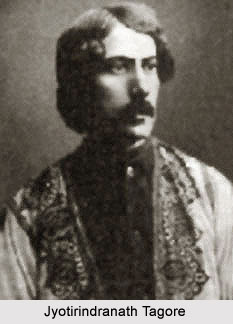 Jyotirindranath Tagore was a great theatre personality. He was a playwright, composer, and translator of Bengali theatre. Born in 1849 he was the fifth son or Debendranath Tagore. He nurtured the latent dramatic talents in his younger brother Rabindranath Tagore. Jyotirindranath Tagore was a prime organizer of the patriotic National or Hindu Mela and Sanjivani Sabh. He was also closely associated with the cultural bodies like the Jorasanko Theatre within the household, Vidvajjan Samagam, and Bharat Sangit Samaj.
Jyotirindranath Tagore was a great theatre personality. He was a playwright, composer, and translator of Bengali theatre. Born in 1849 he was the fifth son or Debendranath Tagore. He nurtured the latent dramatic talents in his younger brother Rabindranath Tagore. Jyotirindranath Tagore was a prime organizer of the patriotic National or Hindu Mela and Sanjivani Sabh. He was also closely associated with the cultural bodies like the Jorasanko Theatre within the household, Vidvajjan Samagam, and Bharat Sangit Samaj.
Jyotirindranath Tagore as a Theatre Personality
Jyotirindranath Tagore`s first play, namely the farcical Kinchit Jalajog i.e. `Light Refreshment`, was staged by the National Theatre in 1873. This was followed by the historical Puru-Bikram i.e. `Puru`s Valour` in 1874 at Bengal Theatre. His dramatic creativity found expression primarily in some of the streams. These can be mentioned as farces or satires and historical plays. Sarojini in 1876, Ashrumati in 1880, Sivapnamayi in 1883 are historical. The farces include Eman Karma Aar Karba Na i.e. `Won`t Do Such Deeds Again` in 1877. This was remodelled as Alik Babu in 1900 and Hite Biparit i.e. `Expectations Reversed` in 1896. Manamayi, Basantalila, Dhyanabhatiga are some of the musicals. Eman Karma and Manamayi were that produced at Jorasanko. The cast for these plays were selected from the family members.
The majority of his plays were translations from Sanskrit, English, and French. Kalidasa, Bhavabhuti, Shakespeare, and Moliere contributed to the bulk of this genre. He wanted to steer clear of the impact of Madhusudan Dutt`s drama, particularly in diction. His farces are more funny than satirical, which had been the vogue with Dutt, Ramnarayan Tarkaratna, and Dinabandhu Mitra. He was more liberal and human in his approaches to social problems.
Among other activities, he set to tune some songs in Rabindranath Tagore`s Balmiki-Pratibha i.e. "Valmiki`s Genius" in 1881 and Kal-mrigaya i.e. `Fateful Hunt` in 1884. Jyotirindranath Tagore also commissioned Tarkaratna to write plays. He is renowned as a dramatist who had travelled beyond Bengali theatre. Some of his works were translated into Gujarati and Marathi. His essays on Sanskrit theatre, basically drawn from Sylvain Levi`s writings and other sources, remain confined to pages of periodicals, but reveal his insight into theatrical art.
Jyotirindranath Tagore died in the year 1925.




